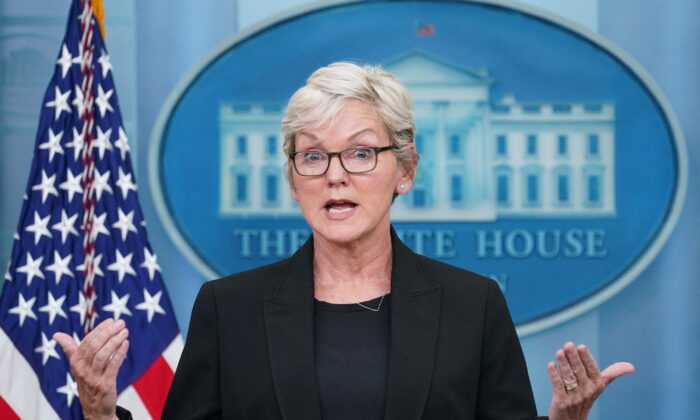A warning from the Department of Energy (DOE) that LNG exports could raise energy prices and worsen climate impacts has been met with industry criticism.
The Department of Energy (DOE) has released a study warning that expanding liquefied natural gas (LNG) exports could raise domestic energy prices and exacerbate climate impacts, sparking criticism from the incoming Trump administration and backlash from the business community and energy industry.
The DOE released its long-awaited study on the economic and environmental impacts of LNG exports on Dec. 17, with the report coming after President Joe Biden in January halted approvals of LNG exports to big consumers in Asia and Europe so that has administration could carry out the analysis.
“Unfettered exports of LNG would increase wholesale domestic natural gas prices by over 30 percent,’’ costing American households an additional $100 a year by 2050, Energy Secretary Jennifer Granholm said in a statement on the study, which also found that increased U.S. exports of LNG would displace renewable energy sources like wind and solar, and lead to sharply higher global greenhouse gas emissions.
Granholm added that the DOE intends the study’s findings to guide decisions by future administrations on whether authorizing certain LNG export permits is in the public interest. “Today’s publication reinforces that a business-as-usual approach [to LNG exports] is neither sustainable nor advisable,” Granholm said.
Trump to Scrap LNG Permit Freeze
President-elect Donald Trump has vowed to end Biden’s moratorium on new LNG export permits when he returns to the White House.
“When he takes office, President Trump will make America energy dominant again, protect our energy jobs, and bring down the cost of living for working families,” Karoline Leavitt, spokeswoman for the Trump transition team, told The Epoch Times in an emailed statement.
Leavitt added that voters elected Trump to deliver on his campaign promises, and that includes unleashing domestic energy production to lower costs. “Families have suffered under the past four years’ war on American energy, which prompted the worst inflation crisis in a generation,” she said.
The DOE analysis was praised by environmental groups but criticized by the fossil fuel industry and the business community, with the U.S. Chamber of Commerce questioning the DOE study’s methodology and accusing it of distortion.
“We will thoroughly review the DOE report, but it appears to rely on questionable methodology and puts a thumb on the scale to downplay the clear economic, environmental and security benefits of U.S. LNG,” U.S. Chamber of Commerce Senior Vice President of Policy Marty Durbin said in a statement.
“This contradicts many other analyses that detail the benefits of LNG exports—including Phase 1 of the Chamber-supported study released today by S&P Global.”
The S&P Global study underscored the role of abundant domestic natural gas production in mitigating price pressures, suggesting the DOE’s concerns about price spikes may be overstated. It predicted that continued LNG exports would result in less than 1 percent residential natural gas price increases through 2040, calling this impact “minimal” compared to the economic benefits.
Halting growth in the U.S. LNG export sector puts at risk around 100,000 jobs per year in the United States and over $250 billion in gross domestic product (GDP) while also risking diminishing U.S. geopolitical influence and jeopardizing the country’s reputation and a reliable and affordable energy supplier to allies, the S&P Global study found.

DOE Report a ‘Bold Step’
By contrast, the Sierra Club urged the DOE to deny any pending LNG export applications, echoing the agency’s findings that an “unfettered” buildout of LNG exports carries risks to consumers and the climate, while calling the report a “bold step.”
“We are grateful that the Department of Energy’s updated studies clearly demonstrate what we and communities living with these facilities know to be true: methane gas exports are not in the public interest,“ Cathy Collentine, a campaign director at the Sierra Club, said in a statement. ”US LNG exports raise energy prices, harm communities, and exacerbate the climate crisis.”
The American Petroleum Institute (API) and the American Gas Association (AGA) both condemned the DOE report, arguing that multiple independent studies have shown that continued LNG exports strengthen the economy, bolster global energy security, and drive climate progress.
“It’s time to lift the pause on new LNG export permits and restore American energy leadership around the world,” API president and CEO Mike Sommers said in a statement.
“After nearly a year of a politically motivated pause that has only weakened global energy security, it’s never been clearer that U.S. LNG is critical for meeting growing demand for affordable, reliable energy while supporting our allies overseas.”
Justification of ‘Grave Policy Error’
Karen Harbert, president and CEO of AGA, called the DOE report a “clear and inexplicable attempt to justify their grave policy error.”
“America’s allies are suffering from the weaponization of natural gas and energy deprivation and any limitations on supplying life essential energy is absolutely wrong-headed,” Harbert said in a statement.
“We look forward to working with the incoming administration to rectify the glaring issues with this study during the public comment period.”
The DOE has opened a 60-day public comment period to gather feedback on the report, with Granholm calling for input from stakeholders, including environmental groups, industry representatives, and the public, to help shape the final decision-making process on U.S. LNG exports.
“Given that the comment period for the study will continue into the next Administration–and that there are a limited number of applications that are concurrently ready for the DOE ‘public interest’ review–decisions about the future of LNG export levels will necessarily be made by future Administrations,” she said.
“Our hope is that we can now assess the future of natural gas exports based on the facts and ensure authorizations are reviewed in a manner that truly advances the public interest of all the American people,” Granholm added.

